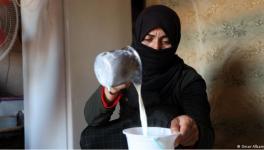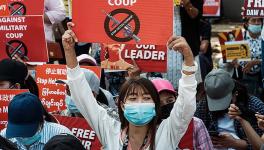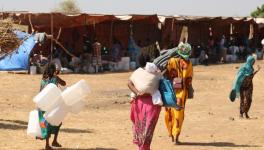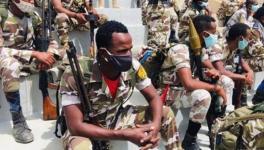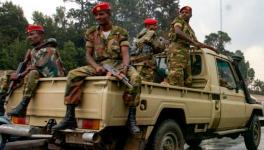Humanitarian Situation in Northern Ethiopia Set to Worsen Dramatically, Warns OCHA
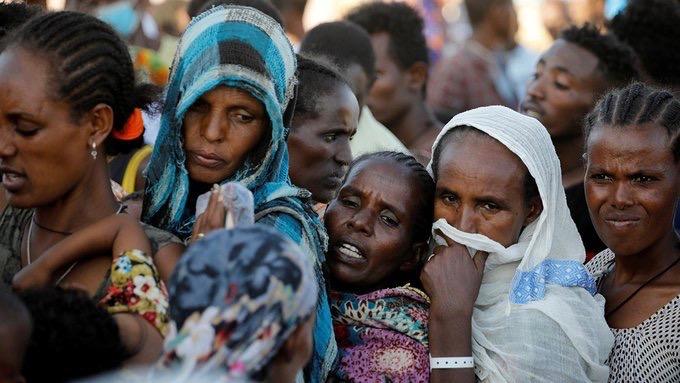
(Photo: via Ethiopia Insight)
The UN Office for the Coordination of Humanitarian Affairs (OCHA) warned that “the humanitarian situation in the North of Ethiopia is set to worsen dramatically” as aid trucks have been cut off from accessing the famine-affected region since August 22. This was after the Tigrayan rebel forces fighting the Ethiopian government pushed further down south in the Afar regional State, through which run the supply routes for aid coming in from the neighboring Djibouti port in Djibouti.
In a statement on Thursday, September 2, acting humanitarian coordinator for Ethiopia, Grant Leaity, said, “An estimated 5.2 million people, or 90% of the population across the Tigray region, urgently need humanitarian assistance, including 400,000 people already facing famine-like conditions, to avert the world’s worst famine situation in decades. Millions are on the brink of going hungry, including 1.7 million people in the bordering areas of the Afar and Amhara regions.”
He further pointed to the “alarmingly high levels of malnutrition” among pregnant women and young mothers. UNICEF recently warned that life-threatening acute malnutrition can affect more than 100,000 children over the coming 12 months.
Lack of vaccinations against polio, measles and COVID-19 is affecting more than 1.5 million people. An estimated 2.3 million people in need of emergency health kits have also been deprived.
“A minimum of 100 trucks of food, non-food items, and fuel must enter Tigray every day to sustain an adequate response. To date, and since July 12, only 335 trucks have entered the region – or about 9% of the required 3,900 trucks. Not one single truck has entered the Tigray region since 22 August,” Leaity added.
Responding to his claim that “logistical and bureaucratic impediments including long delays for clearance of humanitarian supplies render passage extremely difficult,” the Ethiopian prime minister’s spokesperson, Billene Seyoum, said in a press conference on the same day that it is incorrect to imply that the Ethiopian government is blocking aid.
The number of checkpoints en route has been reduced from seven to three to facilitate faster movement. However, while facilitating the movement of trucks, the government is also obliged to ensure its safety, the Ethiopian government maintains.
The US has been leading the international effort to sanction Ethiopia on charges of blocking humanitarian aid supply. Last month, the administrator of USAID, Samantha Power, repeated this allegation. However, her subordinate who heads the USAID mission in Ethiopia, Sean Jones, in an interview to Ethiopian public broadcaster ETV on August 25, pointed the finger at the Tigray People’s Liberation Front (TPLF).
US policy contradicts observations by USAID head in Ethiopia
The TPLF regained control over most of Tigray State soon after the federal government declared a unilateral ceasefire on June 28 and withdrew the army. The army had been deployed in November 2020 to depose the TPLF from the regional State government after it attacked a federal army base in the State’s capital city, Mekele.
Not stopping at the borders of Tigray State, the TPLF has pushed further south into the neighboring regional State of Amhara, and southeast into the State of Afar.
In “every town they’ve gone into they looted the warehouses, they’ve looted trucks, they’ve caused a great deal of destruction in all villages they visited and it’s a great concern for humanitarians,” Sean Jones, who handles USAID’s ground operations in Ethiopia, said in the interview.
Accusing the TPLF of being opportunistic, Jones said, “we do have proof.. that several of our warehouses have been looted and completely emptied in the areas” the TPLF has entered.
In a response, TPLF’s spokesperson Getachew Reda said, “There appears to be much fuss over USAID representative Sean Jones’ remark… While he graciously blamed the TPLF for being ‘opportunistic’, whatever that means, he did not however squarely blame our forces for actually committing the said looting.”
“[W]hile we cannot vouch for every unacceptable behavior of off-grid fighters in such matters,” he added, “we have evidence that such looting is mainly orchestrated by local individuals and groups.”
Despite the assertion by Jones that the TPLF is disrupting aid supply, it appears that the official US policy is to continue placing the blame on the Ethiopian federal government.
In a statement on September 2 timed to correspond with the one by OCHA, US state department spokesperson Ned Price said that “access has been limited to but a trickle by the government of Ethiopia. Warehouses sit empty in Tigray, because the government has put a stranglehold around the region, trucks with life saving assistance remain idle as administrator Power lamented a month ago…”
Criticizing the repeated accusations against the federal government, an editorial in the state-owned ENA said, “In response to the international call for providing smooth flow of relief supplies which supplemented 30 percent of the relief inputs, the government withdrew the Ethiopian National Defense Force (ENDF) from Tigray in unilateral declaration of ceasefire to facilitate for peaceful farming season for the farmers in Tigray Region and for peaceful transmission of food aid to the needy citizens in the region.”
“However,” as per the editorial, “instead of supplementing to the peaceful efforts of the government, the terrorist organization (has waged) a massive war on the peoples and government of Ethiopia and obstructed the smooth transition of food aid to the needy in Tigray by blocking the transport route and further expanding the war into Afar Region with a goal of cutting off the country from the lifeline of trade via Port of Djibouti.”
Get the latest reports & analysis with people's perspective on Protests, movements & deep analytical videos, discussions of the current affairs in your Telegram app. Subscribe to NewsClick's Telegram channel & get Real-Time updates on stories, as they get published on our website.











